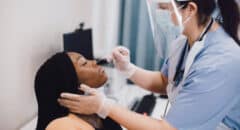
In record time, the Omicron variant has become the dominant variant in the United States, accounting for 73% of new infections last week, the U.S. Centers for Disease Control and Prevention said Monday.
That rate suggests that there were more than 650,000 Omicron infections in the United States last week, according to the Associated Press.
CDC data show nearly a six-fold rise in Omicron's share of infections in just one week, and it's even higher in many parts of the country. Omicron accounts for an estimated 90% or more of new infections in the New York area, the Southeast, the industrial Midwest and the Pacific Northwest.
Delta became the dominant variant at the end of June, and it caused more than 99.5% of coronavirus cases as recently as the end of November, CDC figures show.
The new data reflect the kind of growth in Omicron seen in other countries, CDC Director Dr. Rochelle Walensky said Monday.
"These numbers are stark, but they're not surprising," she notes.
Omicron: What Should You Do If You Test Positive?
Concern as the holidays approach
Dr. Robert Glatter, an emergency room doctor at Lenox Hill Hospital in New York City, said the timing of Omicron's surge is particularly troubling.
"The rapid and exponential spread of Omicron is concerning, especially five days before Christmas, as travel by road and air eclipses even pre-pandemic levels seen in 2019," Glatter says. "Omicron is much more transmissible than Delta, with cases doubling every 2-3 days... Meanwhile, the Delta variant, which had been the dominant strain of the virus in the U.S. [before] last week, has now dropped back to about 27% of cases sequenced."
"With a lack of rapid tests available in pharmacies, and long lines in major U.S. cities, the upcoming holidays represent a potential cauldron of viral spread with the U.S., as hospitals in the Northeast and Midwest struggle with reduced hospital bed capacity from the ongoing Delta surge," Glatter adds. "The National Guard has already been dispatched to at least six states, with many more expected in the coming weeks."
The alarm about Omicron was first sounded less than a month ago by South Africa and it was designated a "variant of concern" by the World Health Organization on Nov. 26. So far, it's been detected in about 90 countries, the AP reports.
Dr. Eric Topol, head of the Scripps Research Translational Institute, told the AP that other countries had seen Omicron's fast growth, but the U.S. data showed "a remarkable jump in such a short time."
Topol also said it's unclear how much milder Omicron really is compared with other variants.
"That's the big uncertainty now," Topol says. "We have to count on it being a lot of hospitalizations and a lot [of] severe disease from Omicron."
RELATED: New Symptoms of the Omicron Variant
How to protect yourself
Early studies suggest the fully vaccinated will need a booster shot for the best chance at preventing Omicron infection, but even without the extra dose vaccination still should offer strong protection against severe illness and death.
"All of us have a date with Omicron," Dr. Amesh Adalja, a senior scholar at the Johns Hopkins Center for Health Security in Baltimore, told the AP. "If you're going to interact with society, if you're going to have any type of life, Omicron will be something you encounter, and the best way you can encounter this is to be fully vaccinated."
In addition to getting vaccinated, the CDC recommends the following:
- Wear a mask to protect yourself and others and stop the spread of COVID-19.
- Stay at least 6 feet (about 2 arm lengths) from others who don’t live with you.
- Avoid crowds and poorly ventilated spaces. The more people you are in contact with, the more likely you are to be exposed to COVID-19.
- Clean your hands often, either with soap and water for 20 seconds or a hand sanitizer that contains at least 60% alcohol.
- Avoid close contact with people who are sick.
- Cover your cough or sneeze with a tissue, then throw the tissue in the trash.
- Clean frequently touched objects and surfaces daily. If someone is sick or has tested positive for COVID-19, disinfect frequently touched surfaces.
- Monitor your health daily.









